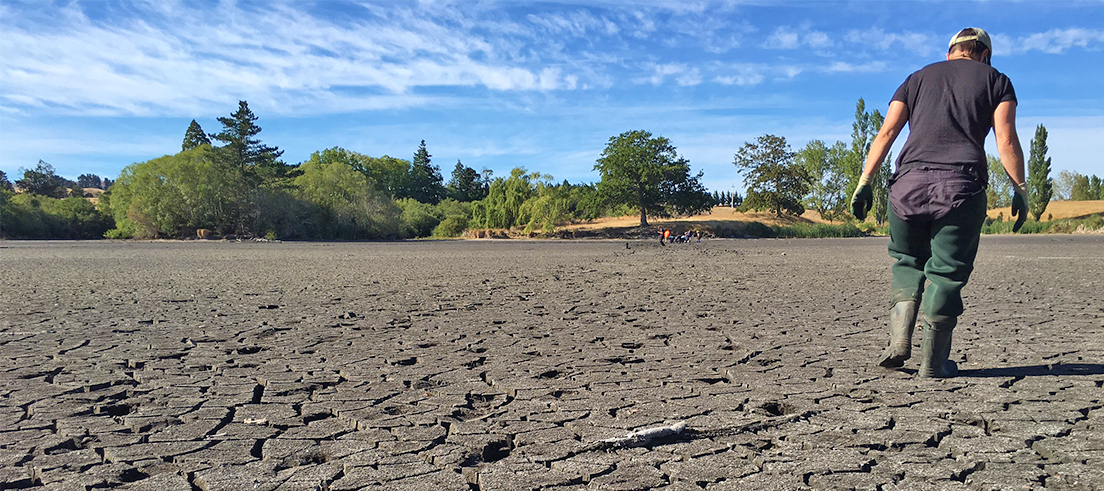
Preparing for a hot, dry Canterbury summer
After experiencing years of easterly winds and wet summers, it’s time to gear up for a return to frequent nor’westers and a hot, dry season. Get ready for the possibility of high temperatures and water scarcity in an El Niño summer.
Chances are, we’re in for a scorcher in Canterbury this summer. Sea surface temperatures are high, and according to NIWA, current El Niño conditions will likely intensify in the next few months. Long dry spells are expected for the Canterbury plains.
Preparing for El Niño this summer
During an El Niño weather pattern, New Zealand generally experiences stronger or more frequent winds from the south-west in spring and west in summer. This weather pattern can also bring increased risks of drought and water scarcity, wildfire, heat-related human and animal health concerns, along with flooding. So it’s important to have a plan and to be prepared.
Set dates for key decisions depending on financial, climate, soil moisture, and feed conditions. Discuss your plan with trusted advisers and keep it up-to-date. Make decisions early and act.
Monitor seasonal forecasts, and extreme weather and fire warnings. Check out NIWA's resources online, including the drought forecasting dashboard.
Growers should adapt irrigation strategies based on forecast climatic conditions and irrigate their most profitable blocks first.
Careful irrigation planning will be key. Plan for irrigation restrictions, keep water reserves, including for firefighting. If you have any questions or concerns act early and get in touch with your industry group.
If you’re in a fire-prone area, make sure you have a plan for keeping yourself, your family and staff, and your stock safe in case of a blaze. Keep up to date with your local fire restrictions
Tips for drought management
Know your soil moisture before irrigating
NIWA publishes daily soil moisture deficit maps on its website, which give an overview of how dry the ground is in your region, but soil moisture probes are the best way to measure exactly when your paddocks need to have water applied.
Remember to keep an eye on the weather forecast before programming irrigation – if rain is coming, factor that in. Check the irrigation restrictions first to see if you have water available.
Efficient irrigation is key
Putting the right amount of water on crops and pasture – within the paddock boundary – at the right time is the cheapest and most efficient way to utilise irrigation water.
Check your irrigator is programmed correctly, especially after it has lost power. Programs could have reset and may not cover paddocks accurately after a power cut.
When it’s blowing, you need to account for wind drift. In a strong nor’wester, make sure your irrigator’s end gun range stops well short of the eastern edge of the paddock you want to irrigate, especially if it’s near your property boundary or a road. Spray on roads can be dangerous for vehicles and degrade the road surface, making it more likely that potholes will form.
Resources for drought management
Beef + Lamb, Dairy NZ, and Deer NZ provide resources for drought management. Government agencies like Ministry for Primary Industries (MPI) and support groups like the Rural Support Trust offer additional guidance and assistance on how to deal with challenges of farming in tough conditions.
Beef + Lamb, Dairy NZ and Deer NZ
Beef + Lamb, Dairy NZ and Deer NZ all have resources and advice on feed and stock water for livestock on their websites – just search your industry partner’s name and the word ‘drought’.
Ministry for Primary Industries (MPI)
The Ministry for Primary Industries (MPI) has a webpage with dedicated advice on preparing for the consequences of an El Niño summer.
Civil Defence Emergency Management Canterbury
The Civil Defence Emergency Management Canterbury website has a section dedicated to emergency preparedness.
- Find out more about fires in Canterbury.
Rural Support Trust
The Rural Support Trust (RST) is made up of local rural people who understand the pressure that farmers face. The trust has people you can talk to in North, Central and South Canterbury about the challenges of farming in tough conditions.
- Visit the RST website to see their resources to help you get through a dry period.
